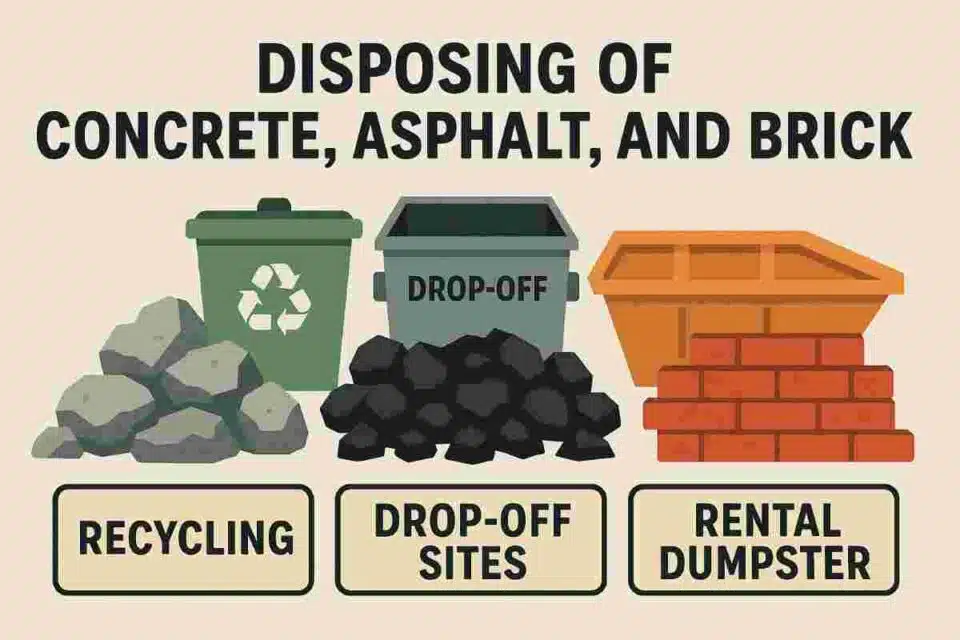Last Updated on October 8, 2025 by Admin
Every construction or renovation project comes with its fair share of debris, but few materials are as challenging to dispose of as concrete, asphalt, and brick. These heavy, dense materials can’t simply be tossed in a curbside bin or loaded into a pickup truck without creating safety risks, overloading vehicles, or running into disposal restrictions.
ConstructionCareerHub App is LIVE — built ONLY for construction careers. Don’t apply with a weak resume.
Get ATS-ready Resume Lab + Interview Copilot + Campus Placement Prep (resume screening, skill gaps, interview readiness) — in minutes & Other advanced features.
Explore Smarter Construction Career Tools →Quick check. Big impact. Start now.
For contractors and property owners alike, having a clear plan for managing these materials is essential. With the right approach—and the support of a trusted partner like Temporary Dumpster—you can keep your project safe, efficient, and compliant with local regulations.
Table of Contents
Why Heavy Materials Require Special Consideration
Concrete, asphalt, and brick are among the heaviest forms of construction debris. A single cubic yard of concrete can weigh over 4,000 pounds, while bricks and asphalt quickly add up in weight as well. Because of this:
- Transport can be tricky: Overloading trucks or small trailers can damage vehicles and pose road hazards.
- Disposal sites have rules: Many landfills and transfer stations have strict weight limits or require separated loads for recycling.
- Labor demands are higher: Handling heavy debris without proper equipment can increase the risk of injury.
This is why professional waste solutions, like a construction dumpster rental, are often the safest and most cost-effective choice.
Disposal Options for Concrete, Asphalt, and Brick
1. Recycling Centers
Many facilities accept clean concrete, asphalt, and brick for recycling. These materials can be crushed and reused as aggregate in new construction projects, making recycling an eco-friendly option. However, transporting heavy debris to these centers often requires specialized equipment and multiple trips.
2. Donation or Reuse
If bricks or concrete slabs are in good condition, they may be reused for landscaping, retaining walls, or community projects. Donating to local organizations can reduce waste while benefiting others. Still, this option only works if the materials are intact and in manageable quantities.
3. Roll-Off Dumpsters
For most contractors, renting a dumpster is the simplest and most efficient solution. A 20-yard dumpster rental is often the ideal size for heavy debris. It’s large enough to handle substantial amounts of concrete, asphalt, or brick, but not so big that weight limits become an issue.
The Benefits of Using a Dumpster for Heavy Debris
- Convenience: Dumpsters are delivered directly to your job site, eliminating the need for multiple trips to disposal facilities.
- Safety: Workers can load debris directly into the container, reducing the risk of injuries from hauling or lifting.
- Cost Efficiency: Renting a dumpster often costs less than arranging multiple hauling services, especially for large projects.
- Compliance: Companies like Temporary Dumpster ensure that materials are disposed of according to local regulations, with an emphasis on recycling whenever possible.
Tips for Loading Heavy Materials into Dumpsters
- Distribute Weight Evenly: Place heavier items on the bottom and spread them out to avoid overloading one side.
- Avoid Overfilling: Stay within the fill line to ensure safe transport.
- Use Proper Equipment: Wheelbarrows, dollies, and ramps can make loading safer and more efficient.
- Know the Limits: Check weight restrictions with your rental company to avoid additional fees.
Why Choose Temporary Dumpster?
When it comes to heavy debris, experience matters. Temporary Dumpster provides reliable roll-off containers designed to handle concrete, asphalt, and brick. Their team offers guidance on selecting the right size, and ensures prompt delivery and pickup to keep your project on schedule.
With flexible rental periods, transparent pricing, and a commitment to responsible disposal, Temporary Dumpster is the go-to partner for contractors and property owners managing heavy materials.
Concrete, asphalt, and brick are essential building materials—but once they’re no longer needed, they can quickly become a burden. By exploring recycling, reuse, and especially dumpster rentals, you can manage these heavy materials efficiently and responsibly.
With Temporary Dumpster, you’ll have the right tools and support to handle even the toughest debris, making your project safer, cleaner, and more cost-effective from start to finish.
Related Posts:
- Affordable Construction Dumpster Rental: A Complete Guide to Saving on Jobsite Waste Management
- From Construction Sites to Retail Stores: Exploring the Diverse Applications of Commercial Dumpster Services
- Navigating Construction Debris Container Rentals: A Comprehensive Guide
- Enhancing Efficiency in Construction Site Cleanups
- The Benefits of Renting Construction Dumpsters for Projects


